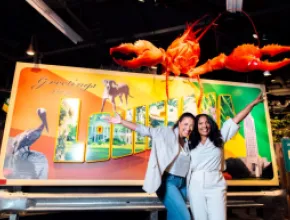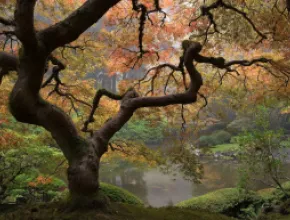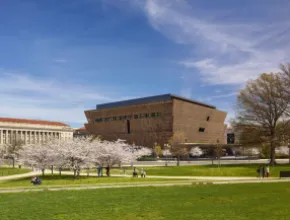Beyond the hustle and bustle of New Jersey’s urban pockets are green and growing regions brimming with opportunities to get in touch with nature.
The state park system encompasses 440,000 acres and includes more than 500 miles of hiking and riding trails and more than 50 historic sites. The state claims to have the largest tract of open space in the Mid-Atlantic Seaboard—the 1.1-million acre Pinelands National Reserve. It could also be argued—and you won’t hear this from Snooki on Jersey Shore or those Real Housewives—that this is the nation’s most developed agritourism state.
Welcome to the Garden State, where farmers are more dependent on tourism than those of any other state in the union, where the great outdoors beckons and where planners will find a cornucopia of naturally inspiring possibilities.
Agritourism
Ag census data puts New Jersey first nationally in the percentage of farm revenue earned from agritourism. According to Brian Schilling, a professor at Rutgers Cooperative Extension in New Brunswick, in order to stay in business, farmers operating small and midsize farms have had to look for ways to add value to their products.
“Many are surprised,” he says. “New Jersey is a little state with roughly 10,300 farms, most of them small. One in five farmers is in agritourism, our studies have shown.”
Agritourism can entail experiences such as farm tours, excursions to pick your own fruits and vegetables, group events, hayrides, corn mazes and picnicking.
At www.visitnjfarms.org, planners will find 30 farms across the state that compete in the corporate events market; 65 that can accommodate large groups either with activities or meeting space; 18 that are equipped for weddings and receptions; and two living history farms.
Two examples of farms near major cities that can host functions and have activities ranging from hayrides to pick your own fruit are Johnson’s Corner Farm (609.654.8643; www.johnsonsfarm.com) in Medford, 20 miles from Philadelphia, and Demarest Farms (201.666.0472; www.demarestfarms.com) in Hillsdale, 26 miles from Manhattan.
Equestrian Encounters
New Jersey is reported to have more horses per square mile than any other state. The U.S. Equestrian Team Foundation is based in New Jersey, and the horse is incorporated in the state seal, created in 1777. The horse was also designated the state animal in 1977.
The database at www.visitnjfarms.org lists 124 farms that have equestrian horse activities.
“A lot of land is devoted to equine,” Schilling says. “We are right up there when it comes to horses.”
The New Jersey Department of Agriculture maintains a website (www.jerseyequine.nj.gov) for all things equine, including a listing of facilities. Among the state’s racetracks are Monmouth Park in Oceanport; Meadowlands in East Rutherford; Freehold in central New Jersey; and Atlantic City Race Course.
A standout is the 147-acre Horse Park of New Jersey (609.259.0170; www.horseparkofnewjersey.com) near Allentown in Monmouth County, which has been growing in prestige and has hosted Olympic trials. The park includes two show rings, an indoor arena and a multipurpose pavilion for trade fairs and other events.
Operated by the Somerset County Park Commission, the Lord Stirling Stable (908.766.5955; www.somersetcountyparks.org) in Basking Ridge offers a range of programs such as hayrides and team building, and has a large room overlooking its indoor riding arena for groups. PageBreak
Fairs and Festivals
Planners can also look to fairs, festivals and other events for both gathering space and excursions. The Garden State is home to almost 20 annual agricultural fairs sponsored mostly by its counties, some at permanent facilities that have group space available.
Fairs include the N.J. State Fair/Sussex County Farm & Horse Show (973.948.550; www.newjerseystatefair.org), held in August at the Sussex County Fairgrounds in the northernmost part of the county. The entire 145 acres of the fairgrounds or smaller portions, including buildings, barns and pavilions, can be rented.
The Agricultural Fair Association of New Jersey (609.984.4389; www.njagfairs.com) has information on members and fairs.
Facilities range from Atlantic County’s David C. Wood 4-H Fairground, in Egg Harbor City, which has meeting and event space, to Van Saun County Park, a major Paramus attraction. Site of Bergen County’s 4-H and Master Gardener Fair, Van Saun houses attractions such as the county zoo, Washington Spring Garden, the Millennium Carousel, a 1.5-mile bicycling and pedestrian trail, a tennis center and picnic pavilions.
The Grape Escape
Producing dozens of grape varietals, New Jersey has 40-plus wineries, a number that has doubled in a decade. Most are open to the public, offering wine tastings, tours and special event space.
The Garden State Wine Growers Association (609.588.0085; www.newjerseywines.com) promotes six wine trails, each with three to nine wineries. Seven of its winery members can host events.
The state has three official American Viticulture Areas: Warren Hills, covering small valleys along Delaware River tributaries; the Central Delaware Valley; and the Outer Coastal Plain, which includes Cumberland, Cape May, Atlantic and Ocean counties.
Following recently signed legislation, state wineries have been able to take Internet and phone orders and ship product directly to New Jersey homes since May 1. Wineries licensed in the 38 other states that allow direct shipping will eventually be able to ship to New Jersey consumers.
“The new shipping laws will be fantastic for our wineries for many reasons, No. 1 of course increased profit potentials and growth,” says Kevin M. Celli, director of sales at Willow Creek Winery. “But to me the main reason is that they will finally receive the recognition they deserve for producing excellent quality.”
At press time, Willow Creek (609.884.7171; www.willowcreekwinerycapemay.com) was set to open in July in West Cape May. It will handle groups of up to 400 for functions and events. A sister property with meeting space, the 25-room Southern Mansion, is located in Cape May’s historic district.
According to Celli, a new website (www.capemaywinecountry.com) is also about to debut. It will promote all six Cape May wineries, including the newly opened Jessie Creek Winery, which has an adjacent B&B, the Inn at Jessie Creek.
“We look forward to working closely with all of the local vineyards arranging bus, trolley and group tours between all of our local wineries,” he says.
Two meetings-ready wineries are located in the Atlantic City vicinity: Renault Winery (609.965.2111; www.renaultwinery.com) in Egg Harbor City and Tomasello Winery (800.666.9463; www.tomasellowinery.com) in Hammonton. Renault Winery is part of the Renault Winery Resort, which includes the 45-room Tuscany House Hotel with 10,000 square feet of meeting space. Tomasello Winery features indoor seating for 180.
“The Atlantic City area has an abundance of wineries that produce award-winning wines,” says Elaine Shapiro Zamansky, manager, media relations for the Atlantic City Convention and Visitors Authority.PageBreak
Wildlife Refuges
The Atlantic Coast brims with refuges that spotlight the area’s abundance of birds and other wildlife.
The 47,000-acre Edwin B. Forsythe National Wildlife Refuge, located directly across the bay from Atlantic City just 10 miles north of the casinos, attracts 250,000 visitors annually.
“We’re on the flyway for the major migrations in the spring and fall,” Zamansky says.
According to the U.S. Fish and Wildlife Service, the 11,500-acre Cape May National Wildlife Refuge, less than 40 miles south of Atlantic City on the southern tip of the state, is one of North America’s top 10 birding hot spots.
Of the nine staffed centers of the New Jersey Audubon Society, three are in Cape May County: two bird observatories and the Nature Center of Cape May (609.898.8848; www.njaudubon.org) overlooking Cape May Harbor.
According to Gretchen Whitman, director of the Nature Center, the facility works closely with the other two in its programs and is involved mainly in marine science, with an emphasis on seasonal happenings, such as the horseshoe crab spawning in May and early June and the fall migration of the Monarch butterfly.
“We can arrange group excursions and different activities in the harbor—nature walks, indoor lectures, tours by 30-passenger pontoon boats, kayaking and fishing, and tented functions,” she says. “We are expanding our facilities and are looking at new activities such as cooking classes.”
About 160 miles up the coast and across from Manhattan is another area of protected marshlands, trails and estuaries at Lyndhurst in the Meadowlands Liberty region.
New Jersey Meadowlands Commission (201.460.1700; www.njmeadowlands.gov), a zoning and planning agency based at Richard W. DeKorte Park, provides various activities and programs, including pontoon boat rides on the Hackensack River and walking tours through different habitats, all with the backdrop of the New York City skyline.
“The commission’s headquarters is a great location for corporate retreats,” says Brian Aberback, public information officer for the commission. “We have hosted many corporate meetings. Guided pontoon boat rides on the Hackensack River are our most popular attraction, and nature walks on the trails within DeKorte Park, a one-square-mile urban oasis, offer a chance to see some of the more than 280 species of birds that make the Meadowlands their permanent or seasonal homes.”
Facilities include the Marshview Pavilion, holding up to 150 people for functions, a 200-seat auditorium and a lecture room and classroom each for up to 40 people.
Tony Bartlett has been writing about the travel trade industry for more than 25 years.






